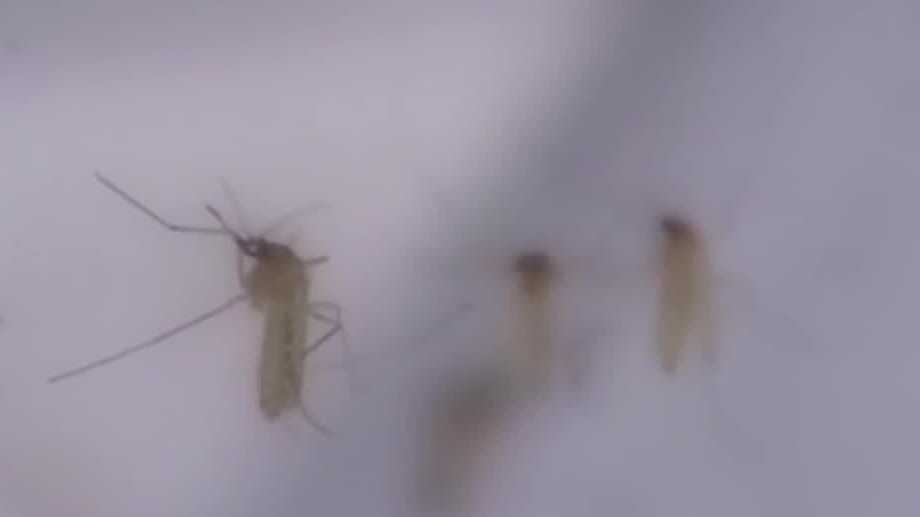There is no danger to the general public. A mosquito virus that has been around since 1961 has been found in Nebraska for the first time. KETV Newswatch 7’s Samantha Pastorino talks about Jamestown Canyon Virus and how to stay safe this summer. Jamestown County Virus (JCV) was found in a mosquito collected from Lake Cunningham on July 25. The virus has never been found in Nebraska before. Dr. Lindsay Hughes, Douglas County Health Department Director, says JCV is rare but can cause very serious symptoms. Uh, about half of the people diagnosed with this virus end up in the hospital for treatment. Uh, but thankfully, no humans have been infected yet this year. Symptoms are said to range from fever and headache to neurological illnesses like meningitis. The virus lasts from two days to two weeks. There is no cure for JCV. There is no medicine that will eliminate the virus itself. So this is something the body has to fight on its own. Unfortunately, Dr. Hughes says, Nebraska didn’t start testing for JCV until June of this year. She says it could have been there much earlier. Now we know we should be able to increase testing. Um, you know, both mosquitoes and humans, I’ve talked to people at Lake Cunningham where we found a swarm of infected mosquitoes on Friday. It’s kind of shocking and kind of scary. Um, you know, there’s a lot of people out on the lake who enjoy it, walk, canoe or kayak, run. If you have kids, your first thought is, “How does this affect my kids?” But for those of you who don’t, don’t let this new information stop you from enjoying the outdoors. You’re going to get bitten anyway this summer. You’re going to get bitten even if you spray bug repellent, so you know,
‘It’s kind of shocking’: First mosquito virus discovered in Nebraska
A mosquito virus that has been around since 1961 has been discovered in Nebraska for the first time. Jamestown Canyon virus (JCV) was discovered in a mosquito collected on July 25th from Lake Cunningham.
A mosquito virus that has been around since 1961 has been found for the first time in Nebraska. Jamestown Canyon Virus (JCV) was found in a mosquito collected from Lake Cunningham on July 25. The virus has never been found in Nebraska before. Dr. Lindsay Hughes, Douglas County Health Department Director, says JCV is a rare virus. “About half of the people diagnosed with this virus have pretty severe cases where they have to be hospitalized for treatment. Fortunately, we haven’t seen any human cases yet this year,” Dr. Hughes said. Symptoms are said to range from fever and headache to neurological illnesses such as meningitis. The virus lasts from two days to two weeks. “There is no cure for JCV. You can’t give a medicine that will make the virus go away. It’s something the body has to fight itself,” Dr. Hughes said. Hughes said Nebraska didn’t start testing for JCV until June of this year. She says the virus may have been around for longer. “Now we should be able to increase testing, both for mosquitoes and humans,” Dr. Hughes said. On Friday, she spoke with people at Lake Cunningham, where the infected mosquito swarm was found. “It’s kind of shocking and scary. There’s a lot of people that go out to the lake and walk, canoe or kayak, jog, and if you have kids, your first concern is what’s going to happen to your kids,” said Paige Marshman, a visitor to the park. For others, this new information won’t stop them from enjoying the outdoors this summer. “You’re going to get bitten anyway. You put on bug spray and you’re still going to get bitten, so you’re just going to keep walking,” said Lynn Potocki, a visitor to the park. The health department recommends preventative measures such as using bug spray, wearing long sleeves and pants, and installing bug screens on windows. KETV News Watch 7
A mosquito virus that has been around since 1961 was first discovered in Nebraska.
Jamestown Canyon virus (JCV) was discovered in a mosquito collected from Lake Cunningham on July 25. The virus has never been found in Nebraska before.
Douglas County Health Officer Dr. Lindsay Hughes says JCV is rare.
“It can be quite severe, with around half of people diagnosed with this virus needing to be hospitalised for treatment. Thankfully there haven’t been any confirmed cases of human transmission so far this year,” Dr Hughes said.
Symptoms are said to range from fever and headache to neurological disorders such as meningitis.
The virus can last from 2 days to 2 weeks.
“There’s no cure for JCV. You can’t give people medicine that will kill the virus itself. It’s something the body has to fight on its own,” Dr Hughes said.
Nebraska didn’t start testing for JCV until June of this year, Hughes said, and it’s possible the virus has been around for longer.
“Now that we know this, we should be able to increase testing in both mosquitoes and humans,” Dr Hughes said.
We spoke to people on Friday at Cunningham Lake, where swarms of infected mosquitoes were found.
“It’s a little bit shocking, a little bit scary. There’s a lot of people out enjoying the lake, walking, canoeing, kayaking, jogging. If you have kids, your first instinct is how is this going to affect my kids?” said Paige Mashman, who visited the park.
For others, this new information won’t stop them from enjoying the outdoors this summer.
“I’m going to get bitten anyway. I spray bug repellent and I’m going to get bitten anyway, so I’m just going to keep walking,” said park visitor Lynn Potocki.
To prevent the spread of the virus, the health department recommends using insect repellent, wearing long sleeves and long pants, and installing insect screens on windows.


